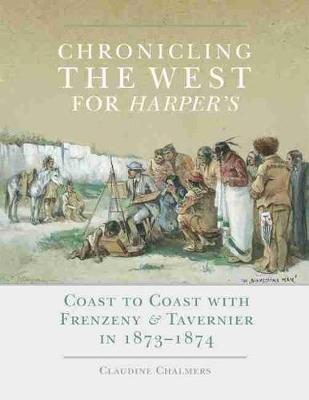The Charles M. Russell Center Series on Art and Photography of the American West
1 total work
The opening of the West after the Civil War drew a flood of Americans and immigrants to the frontier. Among the liveliest records of the westering of the 1870s is the series of prints collected for the first time in this book. Chronicling the West for Harper's showcases 100 illustrations made for the weekly magazine by French artists Paul Frenzeny and Jules Tavernier on a cross-country assignment in 1873 and 1874. The pair - ""Frenzeny & Tavernier,"" as they signed their work - documented the newly accessible territories, their diverse inhabitants, and the changing frontier.
Historian Claudine Chalmers focuses on the life and work of Frenzeny and Tavernier, who were accomplished and adventurous enough to succeed as ""special artists,"" the label Harper's Weekly gave the illustrators it sent into the field. The job required imagination, courage, and adaptability, not to mention expert draftsmanship. Frenzeny, a skilled artist who accepted his adopted country's many cultures, was also a superb horseman. Tavernier had been trained to work fast in a variety of media. Both men had the advantage of viewing America with fresh eyes.
They began their artistic record in the East with An Emigrant Boarding-House in New York. Their journey ended in San Francisco, where they sketched the city's bustling Chinatown and pastoral Marin County suburbs. Along with each illustration, the artists sent Harper's a description; those captions are reproduced here.
Frenzeny and Tavernier documented the frontier as it evolved. They depicted the hazards of travel and settlement, from fires to destitution, and presented disconcerting subject matter - such as the Sioux Sun Dance - in relentless detail. Their skill has made some of their drawings, among them The Strike in the Coal Mine, classics of American culture. With pencil and woodblock, Chalmers shows, these intrepid Frenchmen shaped public perceptions of the West for decades to come.
Historian Claudine Chalmers focuses on the life and work of Frenzeny and Tavernier, who were accomplished and adventurous enough to succeed as ""special artists,"" the label Harper's Weekly gave the illustrators it sent into the field. The job required imagination, courage, and adaptability, not to mention expert draftsmanship. Frenzeny, a skilled artist who accepted his adopted country's many cultures, was also a superb horseman. Tavernier had been trained to work fast in a variety of media. Both men had the advantage of viewing America with fresh eyes.
They began their artistic record in the East with An Emigrant Boarding-House in New York. Their journey ended in San Francisco, where they sketched the city's bustling Chinatown and pastoral Marin County suburbs. Along with each illustration, the artists sent Harper's a description; those captions are reproduced here.
Frenzeny and Tavernier documented the frontier as it evolved. They depicted the hazards of travel and settlement, from fires to destitution, and presented disconcerting subject matter - such as the Sioux Sun Dance - in relentless detail. Their skill has made some of their drawings, among them The Strike in the Coal Mine, classics of American culture. With pencil and woodblock, Chalmers shows, these intrepid Frenchmen shaped public perceptions of the West for decades to come.
